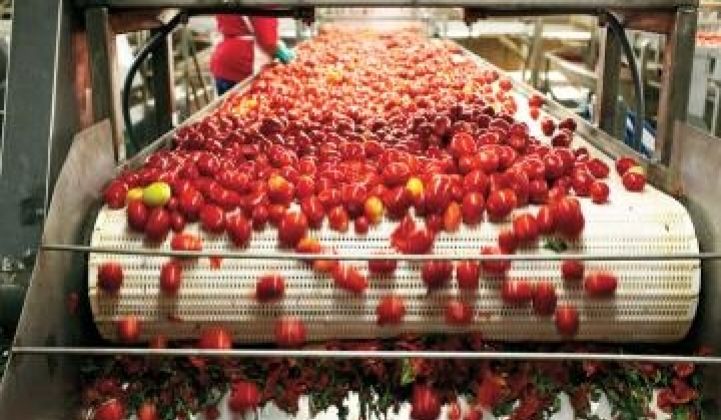I walked along the mud-caked fringe of farmland and tried in vain to make out the profiles of a quarter of a million baby tomato plants. It was hard to believe that in just a few months this perfect rectangle of endless muck would burst into three million pounds of ripe red fruit, and even stranger to think that this vast monoculture just might be leading the world toward agricultural sustainability -- particularly considering that not one of the plants before me was organic, heirloom, or pesticide free.
"When I see my fields, I see a canvas," said Frank Muller, the sunburned avatar of agri-technology who sold 60,000 tons of last year's tomato harvest to transnational food giant Unilever, which subsequently processed the lot into bottles of Cheesy, Chunky, and Robusto-style Ragú spaghetti sauce.
Muller and his two brothers farm 219 mammoth tracts of land in the Sacramento Valley. They are the sons of Swiss immigrants who settled in California less than half a century ago, and while the brothers do cultivate a few organic fruits and vegetables here and there, when it comes to the health and well-being of their cash crop, the Mullers rely on conventional farming methods.
Recent estimates blame agriculture for as much as 30 percent of global greenhouse gas emissions, and nitrogen fertilizers account for more miasma than all those methane-belching cows and sheep combined. But even as the power of the American food movement waxes, organic farms still make up less than 1 percent of this country's cropland. The unignorable presence of that other 99 percent has forced many environmentalists to a singularly pragmatic conclusion: If there is going to be a significant attempt to slash the use of water, fossil fuels, fertilizers, herbicides, insecticides, and fungicides -- the resource-sucking carbon and chemical footprint that has come to define the modern agro-industrial complex -- the bulk of that effort will have to emerge from the operations of large-scale, conventional farms. The assault on business as usual will come from the everyday operations of Frank Muller's farm.
"If you're not organic, it doesn't mean you're bad," Muller says. Still, the notion of the world's megafarms leading the way to global sustainability may chill the hearts of Wendell Berry, Michael Pollan, and Alice Waters, not to mention their legions of followers. The very idea opposes the philosophy and politics of the Slow Food movement, the grass-fed movement, the organic movement, and the local food movement.
But in the past few years, some of the world's mightiest and most profitable tomato syndicates -- including Del Monte, Heinz, and Unilever -- have allied themselves with a small, relatively unknown, and extraordinarily ambitious consortium called the Stewardship Index for Specialty Crops. In 2008 the Stewardship Index began the business of gathering together many of those who share a stake in industrial agriculture, be they farmers, transnational packagers and retailers, or environmentalists. The goal is to get them to agree on what, exactly, one ought to measure to understand and gauge the environmental impact of the seed-to-shelf life cycle of any produce-based product, from frozen french fries to canned almonds to bottled pasta sauce. Working committees include representatives from Bayer CropScience, General Mills, PepsiCo, and Walmart; trade groups such as the Western Growers Association and the National Potato Council; and nongovernmental organizations such as the Natural Resources Defense Council (NRDC), the Organic Center, and the World Wildlife Fund. And then there are the academics -- from Berkeley, Stanford, Yale, and the University of Arkansas' Sam M. Walton College of Business -- all of whom have taken an interest in how sustainability can permeate megafarm and megastore alike.
The Stewardship Index calls its proposed yardsticks "sustainability metrics," and the hope is that once everyone in the industry can quantify environmental sustainability, they will be able to compare and contrast their levels with those of their industry peers and eliminate their own excesses. The logic is fairly straightforward: sustainability aligns with efficiency, and the elimination of any size, shape, or form of wasted resource will save the world's largest companies untold dollars, euros, and yuan. Thus will stewardship of the earth come to align with the profit motive, and sustainability metrics will become the lingua franca of staunch capitalist, radical environmentalist, and everyone in between. At least that's the idea.
Here on the Mullers' fields in Yolo County, the translation of agricultural custom into sustainability metric had already begun. I had come to California to see tomatoes and found a revolution in measurement, so I followed the fruit from family farm to the world's largest retailer in order to catch a glimpse of the future of food.
***
Editor's note: This is an online preview of a story appearing in the Natural Resource Defense Council's Fall 2010 issue of OnEarth Magazine.



